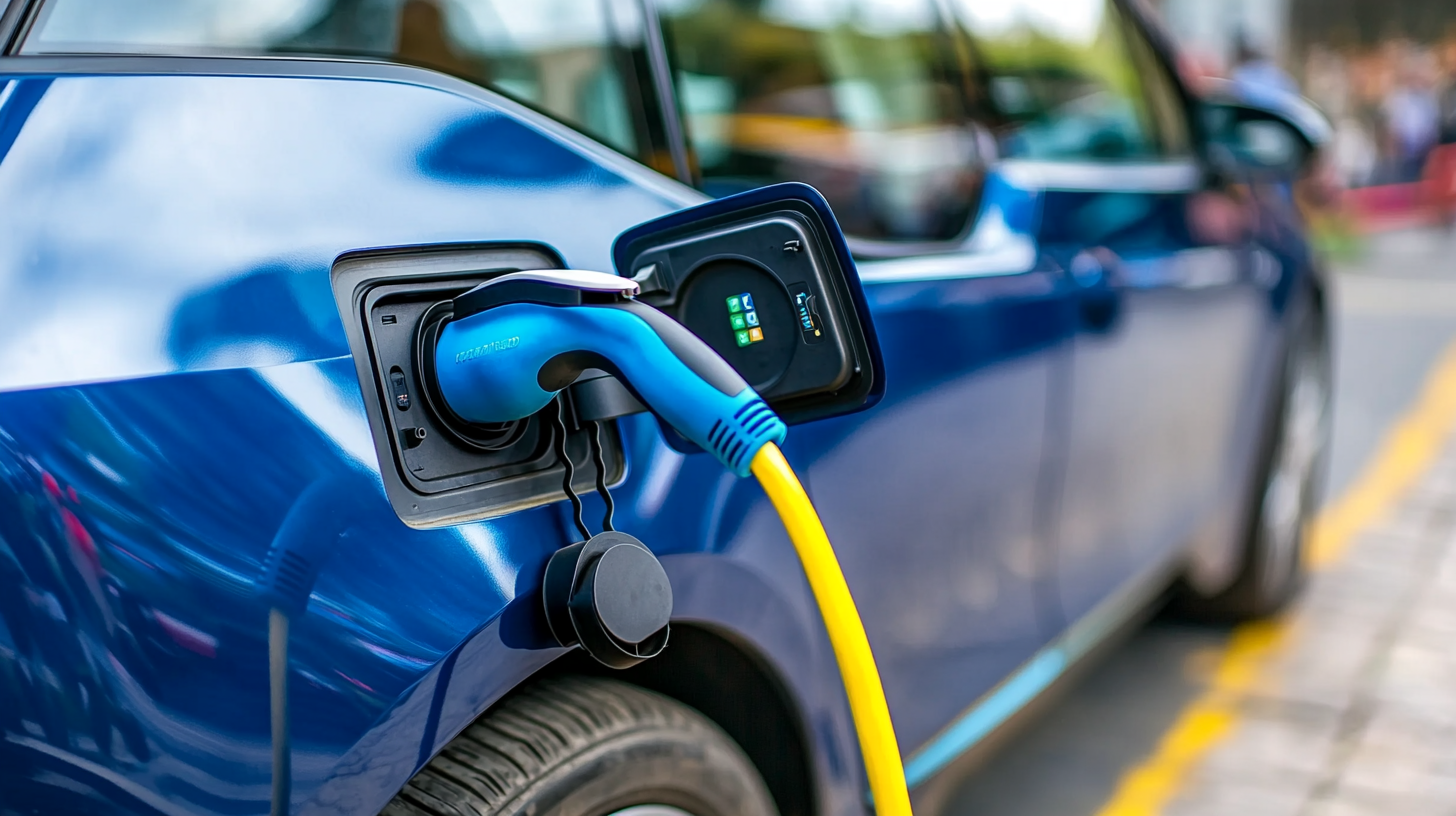As the global shift towards sustainability accelerates, the demand for Business Electric Vehicle Charging solutions has surged, reflecting a pioneering market trend. According to a recent report by the International Energy Agency, electric vehicle sales increased by 40% in 2022, with projections indicating that by 2030, the number of electric vehicles on the road could reach 300 million. The 137th Canton Fair showcased a significant participation of 288,938 international buyers, highlighting a remarkable 17.3% rise in overseas attendance compared to previous editions. This unprecedented turnout underscores the growing interest in innovative technologies, including electric vehicle charging infrastructure, which is crucial for supporting this booming market. With an estimated market value projected to hit $39.2 billion by 2027, the landscape for EV charging manufacturers remains competitive and ripe for exploration. As the industry evolves, businesses must stay informed about key players and emerging technologies to successfully integrate electric vehicle charging solutions into their operations.

The 137th Canton Fair in China recently displayed a myriad of advancements in electric vehicle (EV) charging technology, showcasing innovations that are set to redefine the industry. One prominent trend is the integration of smart charging solutions that enhance efficiency and user experience. These systems utilize advanced software to optimize charging times based on grid demands and user preferences, helping to reduce energy costs and improve grid stability.
Additionally, the emergence of ultra-fast charging stations is gaining traction at the fair. These stations can deliver substantial power in a fraction of the time compared to traditional chargers, making long-distance travel for EV owners more feasible. Coupled with wireless charging technology, which eliminates the need for cumbersome cables, the future of EV infrastructure is poised to be more accessible and user-friendly. The Canton Fair underscores these trends, highlighting the shift toward more sustainable and efficient energy solutions for businesses and consumers alike.
The global electric vehicle (EV) charging market is experiencing significant growth, driven by advancements in technology and increasing demand for sustainable transportation solutions. At the forefront of this evolution are key players in the EV charging manufacturing sector, who are rapidly expanding their capabilities and infrastructure to support the rising number of electric vehicles on the road. Recent insights highlight the importance of strategic investment and innovation in this space, underscoring how these companies are not just providing charging solutions but are also redefining mobility standards for the future.
Manufacturers are utilizing cutting-edge technology to enhance their charging stations, making them faster, more efficient, and user-friendly. The participation of major players at events like the Canton Fair showcases the competitive landscape and the commitment of these companies to shape the future of electric mobility. As industry leaders focus on developing robust charging networks, they are simultaneously addressing sustainability challenges and paving the way for a greener automotive ecosystem. This shift is critical not only for the success of individual manufacturers but also for the collective advancement of the EV industry worldwide.
| Rank | Country | Annual Production Capacity (Units) | Revenue (Million USD) | R&D Investment (Million USD) | Market Share (%) |
|---|---|---|---|---|---|
| 1 | China | 500,000 | 750 | 120 | 25% |
| 2 | USA | 300,000 | 500 | 80 | 18% |
| 3 | Germany | 250,000 | 400 | 70 | 15% |
| 4 | South Korea | 180,000 | 300 | 50 | 10% |
| 5 | Japan | 150,000 | 250 | 40 | 8% |
| 6 | Netherlands | 100,000 | 150 | 30 | 5% |
| 7 | France | 80,000 | 120 | 20 | 4% |
| 8 | United Kingdom | 70,000 | 100 | 15 | 3% |
| 9 | Sweden | 60,000 | 90 | 10 | 2% |
| 10 | Canada | 50,000 | 80 | 12 | 1% |
The recent surge in the electric vehicle (EV) market has significantly impacted the EV charging industry, especially with the participation of international buyers at events like the 137th Canton Fair in China. These buyers are not just seeking products but are also keen on forging local partnerships to enhance their supply chains. Their presence at the fair underscores a growing recognition of the importance of reliable and effective EV charging infrastructure as cities and governments worldwide push for green initiatives.
International buyers bring diverse perspectives and innovations that challenge traditional manufacturing processes and drive competition among local manufacturers. Their demands for high-quality, efficient, and scalable charging solutions are helping to propel the industry forward. As global players continue to invest in China's EV charging sector, the market is experiencing rapid growth, leading to advancements in technology and an increase in the quality of available products. This interaction between international buyers and local manufacturers is essential for fostering an ecosystem that supports sustainable practices while meeting the increasing consumer demand for electric vehicles.

As the electric vehicle (EV) market continues to surge, the upcoming 138th Canton Fair presents a crucial opportunity for businesses to explore advanced EV charging solutions. With a notable increase in state funding, such as Ohio's recent $16 million investment for new fast-charging stations, the infrastructure supporting EV adoption is rapidly evolving. This environment offers innovative manufacturers a platform to showcase cutting-edge technologies that will drive the industry's growth. Reports indicate that by 2030, the global EV charging market could grow by over 25% annually, emphasizing the importance of current advancements in charging technology.
Tips for Businesses: When selecting an EV charging solution, consider the scalability of the technology. Look for companies that offer flexible charging options that can adapt to increasing demand as EV adoption rises. Additionally, explore solutions that integrate advanced management systems for efficient energy use and user-friendly interfaces, as these elements are becoming essential for satisfying tech-savvy consumers.
Moreover, with trends like the advent of mobile charging units, businesses should remain informed about emerging technologies that enhance accessibility and convenience for EV users. Engaging with manufacturers at the Canton Fair can provide invaluable insights into future trends, ensuring that your business stays at the forefront of the evolving EV landscape.
This chart illustrates the market share of the top 10 EV charging manufacturers based on the latest market research. The data reflects the competitive landscape in the industry, showcasing the prominence of these manufacturers as they prepare for opportunities at the 138th Canton Fair.
The global EV charging infrastructure landscape is rapidly evolving, driven by the growing demand for electric vehicles and the corresponding need for robust charging solutions. As nations strive to reduce carbon emissions and transition to sustainable transport systems, investment in charging technology is surging. Countries like China, the United States, and various European nations are committing resources to develop extensive charging networks, enhancing accessibility and convenience for EV users. This shift not only supports the increasing number of electric vehicles on the road but also stimulates local economies through job creation and innovation in the technology sector.
Looking to the future, the prospects for EV charging infrastructure are promising. Analysts predict that advancements in charging technology, such as ultra-fast chargers and wireless charging systems, will soon become mainstream. Additionally, integration with renewable energy sources is expected to become a vital component in the design and operation of charging stations, aligning with broader sustainability goals. As businesses prioritize greener solutions, collaboration among manufacturers, municipalities, and energy providers will be crucial for establishing a comprehensive, reliable, and efficient charging ecosystem. This focus on infrastructure will undoubtedly shape the future of transportation and influence consumer behavior globally.

